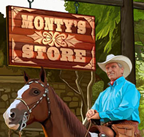I am new to learning about Monty's techniques and am super excited to learn more but I haven't had time to delve into everything yet and would be grateful for help! I purchased my 11 year old Appendix/Paint mare over a month ago. She came from a show background and rides beautifully - I love her canter transition and canter! Her previous owner was a young girl who was anxious around her so didn't ride her much, so the trainers were the ones working with her. My horse would sometimes balk with the young girl and has done this with me quite a bit - I feel that she's testing me as we start our relationship. I'm all about building a partnership with her and know that I'm probably too soft sometimes but I don't want this behavior to continue. My new trainer had me use the crop on her, at which she gave a little buck and generally improved. I don't love the reliance on the crop and wanted to ask you guys! Also, in the past week, she's stopped listening to the canter cue and gives a little buck sometimes. She just trots quickly and doesn't listen and this is after having perfect transitions, easy and smooth!? She's a mare, and people are saying this is why, but I want to work with her on this. I would be so grateful to learn Monty's tools to help with this! Thank you, everyone!!
← back
Horse Behavior and Training
Horse balking and also bucking before canter and not wanting to canter

I am new to learning about Monty's techniques and am super excited to learn more but I haven't had time to delve into everything yet and would be grateful for help! I purchased my 11 year old Appendix/Paint mare over a month ago. She came from a show background and rides beautifully - I love her canter transition and canter! Her previous owner was a young girl who was anxious around her so didn't ride her much, so the trainers were the ones working with her. My horse would sometimes balk with the young girl and has done this with me quite a bit - I feel that she's testing me as we start our relationship. I'm all about building a partnership with her and know that I'm probably too soft sometimes but I don't want this behavior to continue. My new trainer had me use the crop on her, at which she gave a little buck and generally improved. I don't love the reliance on the crop and wanted to ask you guys! Also, in the past week, she's stopped listening to the canter cue and gives a little buck sometimes. She just trots quickly and doesn't listen and this is after having perfect transitions, easy and smooth!? She's a mare, and people are saying this is why, but I want to work with her on this. I would be so grateful to learn Monty's tools to help with this! Thank you, everyone!!
Rewards
Subscribe to Equus Online University and become a part of Monty's worldwide mission to leave the world a better place for horses and for people too.
Students automatically gain access to special rewards, such as exclusive discounts at the Monty Roberts Online Shop. Visit Monty Roberts Online Shop.



This horse has responded to the lack of leadership shown by the previous young & nervous rider. The mare is testing to see if you too are not a leader so causing pain tells her that not only are you not a leader but you are not to be trusted as a partner either. If I were helping you I would advocate Join up, back to basics to build a positive relationship with this horse & proceed from there. It doesn't matter whether this mare was traditionally trained originally or not, you have the opportunity to put something really special in place. She already has the tools to do the job in her toolkit. What she needs from you is proof that you are someone worthwhile & trustworthy. I am not advocating being soft, I am advising you that harsh, brutal, painful methods are outdated, unnecessary & counterproductive in the training of horses. When she acts out respond by causing her to work harder - moving in a small circle for example. When the horse responds appropriately then reward her with appreciative rubbing, stopping work & let her relax or even getting off & walking with her for a short while. PICNIC - positive immediate consequence/negative immediate consequence. Pain has no place in modern horse training. Bad behaviour should bring instant consequences but good behaviour must bring instant reward.
I hope you find this helpful. By all means come back for further advice, problem sharing & support. Cheers, Jo.
Negative consequence - yes, working in a smallish circle is work to a horse & if that happens every time they show a certain behaviour they will regard that behaviour as unfavourable & avoid it. The real trick is to be very quick & very generous with praise & reward - horses will work out how to earn the good stuff really quickly once the pattern is set.
I have shared my experiences with my 4 guys on this forum. There is an entry in Horse Behavour & Training of Trust is a Two Way Street. When you get a chance, look it up. You may enjoy it.
Cheers, Jo.y
My guys stop when the rider falls off & willingly stand with you if you don't get up. This is because they have never been blamed for the rider falling off. After all, it was not their choice to go riding, not their choice of route so the only one responsible for you both being where you are ( & now you on the ground not in the saddle ) is you. In the event of the faller having a more than minor injury they will be found much more quickly if the horse stays with them - horses are easier to see than prone people. Also, horses on their own, loose in the modern world, are likely to get into difficulties & cause more accidents & injuries so staying with the rider is the best option for them too.
Keep us updated on how you get on. Cheers, Jo.